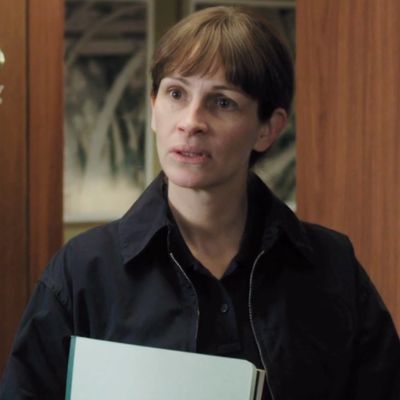
As a crime flick, Billy Ray’s The Secret in Their Eyes, a remake of Juan Jose Campanella’s Oscar-winning 2009 film of the same title, has little suspense, either of the whodunit or cat-and-mouse variety. Nor does it offset said lack of suspense the way some genre other genre films have done, by digging into the minutiae of police work. It’s a cop movie that’s largely uninterested in cops, crimes, or criminals. And yet, despite all that, the film is at times an effective, evocative mood piece. The funereal pall of sorrow that hangs over everything these characters do has a strange, surprising pull.
Much like the original, the film unfolds in two timelines. In 2002, while investigating a potentially radical Los Angeles mosque, FBI investigator Ray Kasten (Chiwetel Ejiofor), Deputy District Attorney Claire Sloan (Nicole Kidman), and DA investigator Jess Cobb (Julia Roberts) are called to a nearby murder scene. Unfortunately, the dead body turns out to be that of Jess’s teenage daughter, raped and killed in horrific fashion. After some poking around, Ray begins to focus on an odd young man named Marzin (Joe Cole), who had once attended one of their office parties and seems to have shown an interest in the young victim. As they pursue the leads, Ray and Claire get closer and closer to each other. But their case seems to hit a dead end when Marzin turns out to be an FBI informant in a major sting operation involving a potential terrorist sleeper cell. That story is anchored by the events of the present day, which sees Ray, now retired from the FBI, returning to L.A. and presenting to Claire and Jess new evidence that he’s been obsessively hunting all these years, and that may allow them to find Marzin and put him away for good.
As a procedural, the film is mostly useless, in part because we see relatively little of the investigation itself. Nor, save for one chase scene set at Dodgers Stadium, do we get any action theatrics to make up for it. (I try not to speculate about such matters, but some of the rushed, awkward editing choices give off a distinct sense of hasty recutting.) Instead, the film focuses on the silent, all-consuming nature of grief, guilt, and vengeance: It’s content to spend more time watching a mother mourn her dead daughter than on a shootout potentially involving the perpetrator himself. The whole story unfolds in an atmosphere of somber angst that renders even the flashback structure moot; both the present and the past are so grim and gray and quiet that they blend together, and it sometimes takes a little while before we figure out which timeline we’re in. That’s part of the idea, I think. The story is built around repetitions, with characters seemingly stuck in eternal loops; Ray, we’re told, has been methodically scouring image databases for 13 years, trying to find one man. This is personal for him, for reasons both stated and unstated.
In previous films like the excellent Shattered Glass and the intelligent-but-inert Breach, writer-director Ray demonstrated a real feel for the rhythms of office politics. He brings some of that here as well. The film is so internal as to be almost claustrophobic; everybody is constantly bound by the walls of professional life and decorum. Save obviously for what’s happened to Jess and her daughter, families are only ever mentioned in passing, and Ray’s quiet longing for Claire feels limited by the fact that he can never quite know her beyond this heated work environment. The surprisingly intense chemistry between Ejiofor and Kidman enhances that. Their little glances and gentle moments of physical contact carry a real charge. We want to see them together.
The Secret in Their Eyes can’t really hold a candle to Campanella’s original, a psychological thriller partly set during Argentina’s “Dirty War” of the mid-1970s. That political angle lent its tale of gnawing injustice an allegorical kick, which also helped sell the film’s one bizarre, last-minute twist. The remake doesn’t do away with the politics, but it does bury them a little deeper. The post-9/11 atmosphere, the investigation into the mosque, the suggestion that there’s a sleeper cell about to be uncovered — these are red herrings as far as the film’s policier narrative is concerned, but they do speak to the powerful hold that 9/11 still has on the American psyche. (Even if today, seen in the light of recent events in Paris, some may wonder if that hold should be even stronger.) This is an unsteady juggling act the film is managing here, with terrorism, sex crimes, police work, romantic obsession, guilt, and grief all in the mix. It doesn’t always work, but the tense, constant sense of unease persists long after the balls have been dropped and the film is over. That’s something.


